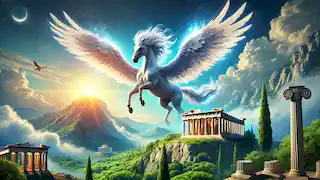In the vast and intricate world of Greek mythology, where gods, heroes, and creatures intertwine their destinies, Pegasus stands out as one of the most enchanting and celebrated figures. The winged horse, a symbol of divine power and unrestrained freedom, represents the timeless link between the heavens and the earth. His story is as grand as the Olympian peaks and as deep as the ocean's mysteries. From his miraculous birth to his immortalization in the night sky, Pegasus' tale is filled with wonder, courage, betrayal, and redemption. The story of Pegasus begins in tragedy and divine intervention. Medusa, a mortal woman cursed by Athena, had been transformed into a fearsome Gorgon with snakes for hair. Her gaze could turn anyone to stone, and her very presence inspired dread. Yet, Medusa’s fate was not always so grim. Once a beautiful maiden, her downfall began when Poseidon, the god of the sea, took a liking to her. In an act of desecration, Poseidon defiled Athena’s temple by forcing himself upon Medusa within its sacred walls. Enraged by the insult to her sanctuary, Athena punished Medusa, transforming her into a monster as a living reminder of divine wrath. The tale took a turn when Perseus, a demigod son of Zeus, was tasked with retrieving Medusa’s head—a feat considered impossible. Perseus received assistance from the gods themselves: Athena gave him a polished shield to serve as a mirror, Hermes lent him winged sandals, and Hades provided a helmet of invisibility. Armed with these divine tools, Perseus sought the Gorgons’ lair. As Perseus approached Medusa, he avoided her deadly gaze by using Athena’s shield. With one swift stroke of his blade, he decapitated her. From the blood gushing from Medusa’s severed neck, a miraculous event occurred. Two beings emerged: Pegasus, the magnificent winged horse, and Chrysaor, a golden-sword-wielding giant. Their birth was a moment of cosmic significance, signifying the power of creation even in destruction. Pegasus, unlike his monstrous brother, was a creature of grace and majesty. As soon as he was born, he soared into the sky, his pristine white wings shimmering with divine brilliance. Witnessing this marvel, the gods themselves were awestruck. Poseidon, who claimed paternity of Pegasus, declared him a sacred creature of both the sea and the skies. Pegasus spent his early days in freedom, unbound by the concerns of mortals or gods. He flew over mountains, rivers, and oceans, leaving mortals below to marvel at the celestial being. According to some legends, Pegasus created springs of water wherever his hooves touched the earth. One of the most famous of these springs was the Hippocrene, located on Mount Helicon. It was said that the muses, goddesses of inspiration, drank from this spring to fuel their creativity. The sight of Pegasus inspired awe, but none could approach him. Despite numerous attempts by mortals and demigods to tame him, Pegasus remained wild and untouchable, a symbol of unrestrained freedom. This changed with the arrival of Bellerophon, a mortal whose destiny was intertwined with the winged horse. Bellerophon, a prince of Corinth, was renowned for his bravery and skill. However, his life was marred by tragedy and deceit. Falsely accused of assaulting the wife of King Proetus, Bellerophon was sent to King Iobates of Lycia with a sealed letter requesting his death. Not wanting to violate the sacred laws of hospitality by directly harming his guest, Iobates assigned Bellerophon a seemingly impossible task: to slay the Chimera, a monstrous creature ravaging his lands. The Chimera was a terrifying hybrid with the head of a lion, the body of a goat, and the tail of a serpent. Its breath spewed flames, and its strength was unmatched. Realizing he could not defeat the beast alone, Bellerophon prayed to Athena for guidance. The goddess appeared to him in a dream, presenting him with a golden bridle. She instructed him to seek Pegasus at the sacred spring of Pirene, where the winged horse often drank. At dawn, Bellerophon ventured to Pirene. Hiding among the reeds, he waited until Pegasus descended gracefully to drink from the spring. With gentle persistence and Athena’s golden bridle, Bellerophon approached the majestic creature. Though Pegasus initially resisted, the divine touch of the bridle calmed him, allowing Bellerophon to mount him. In that moment, a bond was forged between man and horse, one that would lead to legendary deeds. With Pegasus as his steed, Bellerophon flew into battle against the Chimera. The sight of a mortal soaring through the skies on a divine creature was unprecedented. As they approached the Chimera’s lair, the beast roared, its fiery breath scorching the air. Pegasus, with his unparalleled agility, evaded the flames, allowing Bellerophon to launch a series of precise attacks. Using a spear tipped with lead, Bellerophon delivered the fatal blow by thrusting it into the Chimera’s throat. The lead melted in the beast’s fiery breath, choking it and ending its reign of terror. The defeat of the Chimera elevated Bellerophon to heroic status, and his partnership with Pegasus became the stuff of legend. Together, they accomplished other great feats, from vanquishing armies to defeating monstrous foes. However, as with many Greek heroes, Bellerophon’s triumphs sowed the seeds of his downfall. His victories and the bond with Pegasus filled him with pride, and he began to view himself as equal to the gods. In a moment of hubris, Bellerophon decided to ascend Mount Olympus atop Pegasus, believing himself worthy of joining the divine pantheon. This act of arrogance infuriated Zeus, king of the gods. To punish Bellerophon, Zeus sent a gadfly to sting Pegasus mid-flight. Startled by the sting, Pegasus bucked violently, throwing Bellerophon to the earth. The once-great hero survived the fall but was crippled and spent the rest of his days wandering in despair and solitude, a reminder of the consequences of hubris. {{{_03}}} Pegasus, unharmed, flew back to Olympus. Zeus, recognizing the creature’s loyalty and nobility, welcomed him into the divine realm. Pegasus was given the honor of carrying Zeus’ thunderbolts and serving as his celestial steed. His service to the gods solidified his place in the heavens. In recognition of his unparalleled beauty and service, Zeus immortalized Pegasus as a constellation in the night sky. The Pegasus constellation became a symbol of inspiration for poets, sailors, and dreamers. It was said to guide travelers and remind mortals of the link between the earthly and divine realms. {{{_04}}} Through the ages, Pegasus remained a figure of awe and reverence. His story inspired countless works of art, literature, and mythology. To this day, Pegasus is celebrated as a timeless emblem of freedom, creativity, and the unyielding pursuit of greatness. The story of Pegasus is rich with themes that resonate across time. It is a tale of creation born from destruction, the boundless potential of inspiration, and the perils of overreaching ambition. Pegasus’ journey reflects humanity’s eternal longing to transcend earthly bounds and touch the divine. As a symbol, Pegasus endures in both mythology and modern culture. From ancient Greece to contemporary storytelling, he embodies the ideals of beauty, strength, and unrestrained freedom. His legacy reminds us to aspire for greatness while remaining humble and grounded. The tale of Pegasus, woven into the fabric of Greek mythology, is more than a mere story; it is a testament to the enduring power of myths to inspire and teach. From his miraculous birth to his celestial ascension, Pegasus captures the imagination, offering lessons in courage, humility, and the pursuit of dreams.The Origins: Born of Blood and Seafoam

Pegasus Roams Free
Bellerophon’s Quest and Divine Assistance

The Battle Against the Chimera
Hubris and Divine Retribution
Immortalized in the Stars
Themes and Legacy
Conclusion
The Story of the Pegasus
Reading Time: 7 min

About Story: The Story of the Pegasus is a Myth Stories from greece set in the Ancient Stories. This Descriptive Stories tale explores themes of Courage Stories and is suitable for All Ages Stories. It offers Cultural Stories insights. An epic tale of courage, divine grace, and the eternal pursuit of greatness.


















